- Health Conditions A-Z
- Health & Wellness
- Nutrition
- Fitness
- Health News
- Ayurveda
- Videos
- Medicine A-Z
- Parenting
Singer Jesy Nelson Breaks Down Over Terrifying Pregnancy Complications- Why Twin-to-Twin Transfusion Syndrome Is So Dangerous?

Singer Jesy Nelson recently shared an emotional update regarding the complications she is experiencing in her pregnancy with twin babies. Former Little Mix singer Jesy, who is having twins with partner Zion Foster, announced that she has been diagnosed with pre-twin-to-twin transfusion syndrome (pre-TTTS). The condition, which is present in pregnancies involving twins with a shared placenta, has serious risks involved and needs intense medical supervision. As Nelson embarks on this difficult journey, her story enlightens us about a rare but dangerous condition many expectant parents may not know much about.
Twin-to-twin transfusion syndrome is a rare but dangerous condition that arises in monochorionic twin pregnancies, in which identical twins share a single placenta. The placenta supplies the developing babies with oxygen, nutrients, and blood flow, but in TTTS, there is an imbalance of blood vessels that interconnect the twins, and thus the vital resources are not evenly distributed. One twin, or the donor twin, shares excess blood with the other, referred to as the recipient twin. This leads to one baby becoming malnourished and possibly anemic, and the other in danger of heart problems due to too much blood.
Nelson described her diagnosis in a heartfelt Instagram video, explaining that she is currently in the pre-stage of TTTS and undergoing frequent monitoring. "I am being scanned twice a week, and each time, things have gotten a little worse," she shared, expressing her fears and hopes for the health of her babies.
Potential Risks of TTTS
If left untreated, TTTS can have devastating consequences. Medical research indicates that:
- 90% of the cases of untreated TTTS lead to loss of one or both twins.
- Despite treatment, only a 70% survival rate for both twins is assured.
- Severe forms can result in preterm labor, cardiac failure in the recipient twin, and organ failure in the donor twin.
- Complications in long-term survivors include neurological damage and developmental delay in surviving infants.
TTTS usually advances in stages, beginning with minimal changes in fluid levels and worsening as one twin continues to get an unequal share of blood. In extreme cases, fetal laser surgery, referred to as the Solomon technique, can be employed to divide the blood vessels and balance the twins.
Why Identical Twin Pregnancies Are More Complicated
Identical twins may develop differently, and their own unique form of placental sharing can have a dramatic effect on pregnancy risk. Jesy Nelson's twins are considered monochorionic diamniotic (mono/di), which means they share a placenta but have two amniotic sacs. This is the type of pregnancy in about 70% of identical twin pregnancies and carries an increased risk of complications like TTTS, umbilical cord entanglement, and growth restriction.
Conversely, dichorionic diamniotic (di/di) twins both have a separate placenta and amniotic sac, which greatly diminishes the threat of TTTS. Twin pregnancy type is normally identified by early ultrasound, with physicians being able to track future complications from inception.
Other Twin Pregnancy Health Risks
Twin pregnancies, even without the presence of TTTS, entail a variety of health risks to the mother as well as infants:
1. Premature Birth
Over 60% of twin pregnancies end in premature delivery, with birth usually taking place before 37 weeks. Premature infants can have immature organs and need neonatal intensive care (NICU) assistance to assist with breathing, feeding, and infection fighting.
2. Gestational Hypertension and Preeclampsia
Pregnant women with multiples are at increased risk of having high blood pressure during pregnancy. This, if left untreated, can result in preeclampsia, a serious complication of pregnancy that can result in damage to organs, preterm labor, and in some cases, maternal or fetal death.
3. Anemia
Pregnant women carrying multiples are twice as likely to experience anemia, a condition where the body does not produce enough healthy red blood cells. This can lead to fatigue, dizziness, and complications during delivery.
4. Birth Defects
According to John Hopkins Medicine, multiple birth babies are twice as likely to have congenital abnormalities compared to single births. These can include heart defects, neural tube defects, and gastrointestinal issues.
5. Amniotic Fluid Imbalances
When twins have to share a placenta, they are more likely to have polyhydramnios (excess amniotic fluid) or oligohydramnios (not enough amniotic fluid). Both result in distress to the babies during fetal development and can result in premature labor.
6. Postpartum Hemorrhage
Twins are at increased risk of excessive postpartum hemorrhage because their uterus is larger and there are greater blood supply needs.
Jesy Nelson's openness about her challenging experience is raising awareness for TTTS, a condition that few individuals—let alone expectant mothers and fathers—might be aware of. Through her tearful video, Nelson stressed the significance of knowing about twin pregnancies aside from the thrill of having multiples. "We had no idea that this type of thing occurs when you're having twins. We just desperately want to make people aware of this because there are so many people who aren't aware."
Her case reminds us of the intricacies involved in twin pregnancy and the significance of early identification and medical management. For mothers carrying twins, frequent ultrasounds and vigilance can become a life-and-death issue for early detection and better outcomes of both babies.
Through constant medical attention and care, she and her partner Zion Foster remain positive and get ready for their babies to be born. In other parents whose situations are no different, the story of Nelson highlights awareness, medical progress, and emotional encouragement in handling complicated pregnancies.
The expecting parents of twin siblings are advised to discuss TTTS screening and possible interventions with their physicians to give their babies the best chance.
‘Fix Your Handwriting’: Indian Doctors Told to Write Clear, Legible Prescriptions Under New Rules

Credits: iStock
No more scribbling, notes a BBC report from October 1, 2025, where the Punjab and Haryana court tells doctors to fix their handwriting. Now, the National Medical Commission or NMC has issued nationwide order to the doctors to ensure their prescriptions are written in a clear and legible manner.
While jokes around the notoriously bad handwriting of many doctors that only can be read by pharmacist are common in India, but after the High Court's ruling, this joke is taken seriously. The High Court noted that "legible medical prescription is a fundamental right" as it can make a difference between life and death.
What Are The New NMC Guidelines On Doctor's Handwriting?
Under the new directive, the NMC ordered that doctors must:
- Write prescriptions in clear, legible handwriting, avoiding ambiguity.
- Arbitrary or unclear prescription writing will no longer be acceptable, as it compromises patient safety.
- Subcommittees will be formed in all medical colleges to monitor prescription practices and ensure compliance.
- Medical students will be taught the importance of clear prescription writing, making it a core part of clinical training.
The Background Of NMC Guidelines

The Punjab and Haryana High Court ordered doctors to fix their handwritings while it was looking at a case that involved allegations of rape. While checking a medico-legal report written by a government doctor who examined the woman, the court found it incomprehensible.
Justice Jasgurpreet Singh Puri said, "It shook the conscience of this court as not even a word or a letter was legible".
"At a time when technology and computers are easily accessible, it is shocking that government doctors are still writing prescriptions by hand which cannot be read by anybody except perhaps some chemists," said Justice Puri.
Importance Of Clear Prescriptions
The World Health Organization (WHO) identifies medication errors as a major global patient safety challenge, contributing to avoidable injuries and deaths worldwide. Illegible prescriptions are a well-recognised cause of such errors.
A clear and readable prescription also:
Prevents misinterpretation
Poor handwriting leads to misinterpretation of the intended drug name, dosage, or instructions. Many drugs have names that look or sound alike, making clarity critical.
Ensures the right dosage
Unclear instructions when it comes to dosing result in giving out doses that are ten or one hundred times the correct amount, leading to toxicity or therapeutic failure.
Empowers patient understanding
When the patients are able to clearly read and understand the prescriptions and medication labels, they are more likely to take their medications correctly, reducing the margin for errors.
Reduces healthcare costs
Medication errors resulting from unclear prescriptions lead to increased hospital admissions, prolonged lengths of stay, and additional costs, placing a significant burden on the patient and the healthcare system.
Delhi Sees Rising Cancer Burden With Sharp Increase in Oral and Lung Cancers; Breast Cancer Remains Most Common
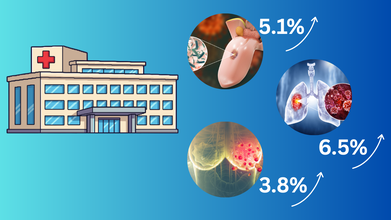
Credits: iStock and Canva
Oral cancer cases recorded the sharpest in Delhi in 2025, as per the Union Health Ministry data presented in the Parliament. While there is no definitive explanation provided by the report by the Union Health Ministry, previous reports show that widespread use of tobacco has increased, and accounted for about 30% of all oral cancer cases in India alone.
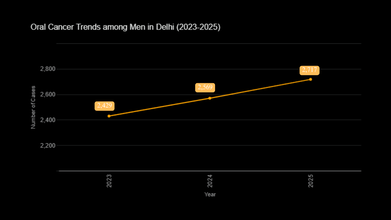
As per the report shared by the Union Health Ministry, a 5.1% increase was scene in the reported increase of oral cancer, while lung cancer rose by 4.9% between the period 2023 and 2025.
Also Read: ‘Fix Your Handwriting’: Indian Doctors Told to Write Clear, Legible Prescriptions Under New Rules
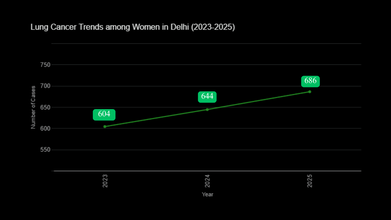
The data showed that lung cancer increased among women, and it rose to 6.5%. In numbers, this would make 686 cases in 2025, which is up from the 644 cases recorded in 2024, and 604 in 2023. Among men, oral cancer had the highest growth, with a 5.8% increase. This led to 2,717 cases in 2025, compared to 2,569 cases in 2024 and 2,429 cases in 2023.
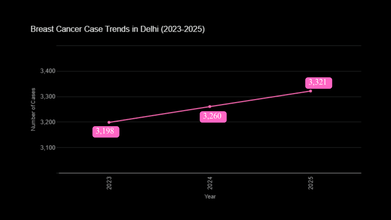
However, breast cancer remained the most prevalent cancer in the city. Data from the National Cancer Registry Programme indicate a steady rise in reported breast cancer cases, increasing from 3,198 in 2023 to 3,260 in 2024 and 3,321 in 2025. Oral cancer ranked as the second most common cancer overall, with combined cases among men and women reaching 3,208 in 2025.
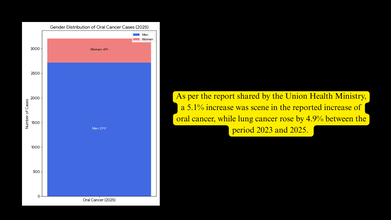
A closer look at the data shows that oral cancer continued to rise in the city over the past three years. In 2023, Delhi reported 2,901 cases, including 2,429 among men and 472 among women. The number rose to 3,051 cases in 2024, with 2,569 cases in men and 482 in women. Among women, cases increased slightly further to 491 in 2025.
The International Journal of Research in Medical Sciences provide the tobacco use, betel quid chewing has seen a rising trend in India. Tobacco use includes chewing gutka and khaini in rural areas as well as smoking cigarettes in urban area, which continues to be the nation's leading preventable cause of cancer.
Cervical Cancer Shows a Decline
Cervical cancer followed a different pattern. Cases among women fell from 741 in 2023 to 716 in 2024, and then to 692 in 2025. This reflects a year-on-year decline of around 3.4 percent over both periods.
Rising Trends in Other Cancers Among Men
Among men, oral cancer showed the sharpest increase. Lung cancer cases also rose, climbing from 1,668 in 2023 to 1,814 in 2025. Prostate cancer followed a similar upward trend, with reported cases increasing from 1,168 in 2023 to 1,301 in 2025.
Delhi’s High Cancer Incidence Rate
The health ministry has pointed to Delhi’s relatively high Age-Adjusted Incidence Rate of cancer. Between 2015 and 2019, the AAIR stood at 146.7 per one lakh population among men and 132.5 among women. These figures are higher than those reported in cities such as Mumbai, Kolkata, Pune and Ahmedabad. The AAIR allows cancer rates to be compared fairly across regions with different age profiles.
Treatment Burden Extends Beyond Delhi
It is also important to note that Delhi attracts a large number of cancer patients from across north India and other parts of the country. Major tertiary care centres, including AIIMS and the Rajiv Gandhi Cancer Institute and Research Centre, contribute to a higher treatment load in the city.
Measles Warning: 'Be Careful, Holidays Worry Us', Says Doctor

Credits: iStock
Rougeole/Measles: Christmas is not even 10 days away and other festivities are also lining up. With the holiday season coming in, more cases of measles are likely to be added to the five which had already been recorded in Montreal.
"It's certain that the holiday season worries us, because we gather, we meet our families, we have more contact, and therefore more opportunities for transmission of the virus," said Dr. Paul Le Guerrier on QUB radio and television, broadcast simultaneously on 99.5 FM Montreal, Tuesday.
As per the medical advisor at Montreal's Regional Public Health Department, a surge in cases during this time of the year is conducive as there will be more gathering. In fact, "almost 95% of population would need to be vaccinated to prevent community transmission."
"At the end of secondary school, we reach levels of 86-88%. But we are not yet at the desired threshold," the doctor specifies.
Can Measles Be Prevented?
The spread could be curbed and a significant outbreak during the holiday season could be avoided, if vaccination is done in full flow. Public health department has sent letters to all schools in Montreal province. "If children do not have two doses of measles vaccine, [they are encouraged] to make an appointment or go see their family doctor to increase their vaccination coverage," explained Dr. Le Guerrier.
The public is also urged to keep a check of common signs and measles symptoms like:
- Fever
- Nasal congestion with runny nose
- Cough
- Conjunctivitis
- Eyes sensitive to light
- Widespread unease
Measles In Canada
The Global News reported that so far, Quebec has confirmed three measles cases linked to pediatric medical center in an off-island suburb of Montreal.
The first case was identified in early December, marking the province’s first measles infection since April. Health officials say people who visited the UP pediatric emergency centre in St-Eustache, Que., on the afternoon or evening of Nov. 28 may have been exposed.
So far this year, Canada has reported more than 5,300 measles cases, largely in Ontario and Alberta. Quebec recorded 36 cases during an earlier outbreak. The provincial government warns additional cases are likely and stresses vaccination as the strongest protection against the highly contagious disease.
Unique Symptoms Of Measles To Look Out For
Measles has a high transmissibility, and high measles immunity levels are required to prevent sustained measles virus transmission. This is why herd immunity for measles could be easily breached.
It easily spreads from one infected person to another through breathes, coughs or sneezes and could cause severe disease, complications, and even death.
Read: Unique Symptoms Of Measles In 2025 And How Long Does The Infection Last?
The most unique symptom or the early sign of measles in the Koplik spots. These are tiny white dots that look like grains of salt on red gums inside the cheeks that appear before the red rash starts to appear on a person's face and then the body.
Furthermore, the symptoms of measles are also characterized by the three Cs:
- Cough
- Coryza or runny nose
- Conjunctivitis or red and water eyes
The progression of the symptom comes in two stages, first is the prodromal stage or Days 1 to 4, where one would notice high fever, cough, runny nose, red and watery eyes, sore throat, fatigue, and Koplik spots.
The second stage is called the rash stage or the days 5 to 10 or even more where rash start to appear on the hairline, and then it runs down the body. It lasts for several days and fades in the same order.
The first symptoms, notes the Centers for Disease Control and Prevention (CDC), appear 7 to 14 days after a measles infection. Often, it could also lead to ear infection, or even diarrhea. Though these complications happen in every 1 in 10 children or individual with measles.
© 2024 Bennett, Coleman & Company Limited

